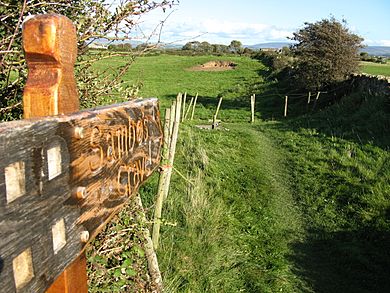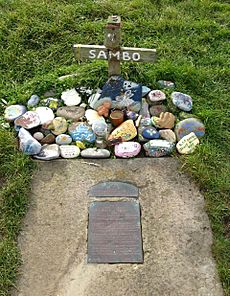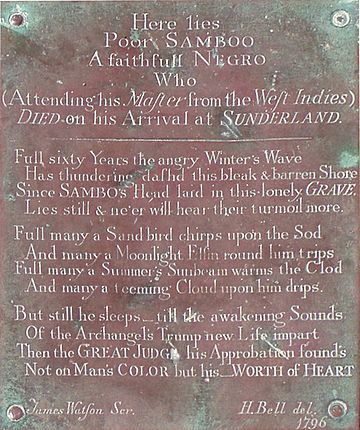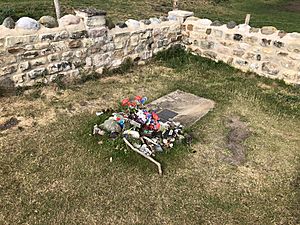Sambo's Grave facts for kids
Sambo's Grave is a special burial spot in a field near a small village called Sunderland Point in Lancashire, England. It's the grave of a dark-skinned cabin boy or slave named Sambo. He was buried in ground that wasn't blessed by the church. Sunderland Point used to be a busy port for ships carrying cotton, sugar, and even slave ships from places like the West Indies and North America. The village is quite small and can only be reached by a narrow road that sometimes gets covered by water at high tide.
History of Sambo's Grave
In the early 1700s, Sunderland Point was an important port for the city of Lancaster. Big ships that couldn't sail all the way up to Lancaster would stop here.
A magazine from 1822, called the Lonsdale Magazine, shared the story of Sambo. It seems this story was passed down by people living in the area. Sambo arrived around 1736 from the West Indies. He was a servant to a ship captain.
After she had discharged her cargo, he was placed at the inn…with the intention of remaining there on board wages till the vessel was ready to sail; but supposing himself to be deserted by the master, without being able, probably from his ignorance of the language, to ascertain the cause, he fell into a complete state of stupefaction, even to such a degree that he secreted himself in the loft on the brewhouses and stretching himself out at full length on the bare boards refused all sustenance. He continued in this state only a few days, when death terminated the sufferings of poor Samboo. As soon as Samboo's exit was known to the sailors who happened to be there, they excavated him in a grave in a lonely dell in a rabbit warren behind the village, within twenty yards of the sea shore, whither they conveyed his remains without either coffin or bier, being covered only with the clothes in which he died.
—Lonsdale Magazine, 1822
The story says that after the ship unloaded its goods, Sambo stayed at an inn. He was supposed to wait there until the ship was ready to leave again. But Sambo thought his master had left him behind. He probably didn't understand the language well enough to find out what was happening. He became very sad and confused. He hid in a loft and refused to eat anything. After just a few days, Sambo died.
Sailors who were in the area found out about Sambo's death. They dug a grave for him in a quiet, lonely spot near the sea. They buried him without a coffin, just in the clothes he was wearing.
Some people also think Sambo might have died from a disease. He might have caught a sickness from Europeans that his body wasn't used to fighting. He was buried in ground that wasn't blessed by the church because he wasn't a Christian. His grave is on the windy shoreline of Morecambe Bay.
The Memorial Plaque
After a new dock opened in 1787, ships stopped coming to Sunderland Point. The village then became a popular place for holidays and sea-bathing.
About 60 years after Sambo was buried, a retired headmaster named James Watson heard Sambo's story. He used to be the headmaster of Lancaster boys' grammar school. James Watson collected money from summer visitors to put a memorial on Sambo's unmarked grave.
James Watson was also the brother of a well-known slave trader from Lancaster, William Watson. James wrote the words for the plaque that is on the grave today. You might notice some old-fashioned spelling and letters on the plaque, like the letter 'ſ' which looks like an 'f'.
|
Here lies |
|
Full sixty Years the angry Winter's Wave Full many a Sandbird chirps upon the Sod But still he sleeps _ till the awakening Sounds James Watſon Scr. H.Bell del. 1796 |
The plaque you see there now is a copy. The original one was stolen. A smaller plaque above it explains this:
|
Thoughtless and irreverent people having |
Preservation of the Grave
Signs in Sunderland Point show Sambo's Grave as a place for tourists to visit. You will almost always see flowers or stones painted by local children on the grave. In 2019, a low stone wall was built around the grave. Also, an art piece called 'Horizon Line Chamber' by Chris Drury was built on the path leading to the grave.
 | Dorothy Vaughan |
 | Charles Henry Turner |
 | Hildrus Poindexter |
 | Henry Cecil McBay |





